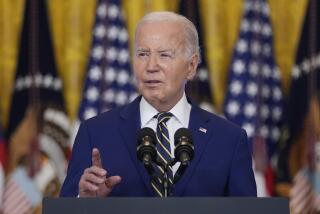NEWS ANALYSIS : A Step for Gay Soldiers but Not for Gay Rights
- Share via
WASHINGTON — He set out on his crusade talking of human rights and fundamental fairness. He ended it six months later speaking of half steps and pragmatism.
And while much remains unsettled on the issue of gays in the military, after a bruising half-year of controversy this much seems clear: President Clinton’s policy--if it is not overturned by Congress or the courts--will mean a small advance for homosexuals who serve in the military but almost none for what organized gay groups consider the broader cause of homosexual rights.
For himself, the best Clinton may be able to hope for is that most voters will forget, if not forgive, the way he seemed to handle the matter. “We just wish this issue would go away,” a senior White House official confided only hours before Clinton announced his “don’t ask, don’t tell, don’t pursue” compromise.
Clinton had said from the outset that his first concern was members of the Armed Forces who want to serve and are willing to keep their homosexuality to themselves. During the 50 years of the ban, these individuals told daily lies, faked romances with members of the opposite sex, even arranged sham marriages to avoid detection and discharge.
Under the Clinton policy, their lives may be improved. They will still live in a closet, perhaps, but that closet is at least a little more spacious and a little more secure. Homosexuals who want to serve will not be forced to lie when they fill out their enlistment forms, and there is slightly more protection for them from investigation.
Engaging in homosexual acts is still grounds for discharge. Individuals are vulnerable to investigation and dismissal if they tell anyone that they are homosexual or if persuasive evidence comes to the attention of military authorities that they are practicing homosexuals. The policy defines homosexual conduct as “a homosexual act, a statement by the individual that demonstrates a propensity or intent to engage in homosexual acts or a homosexual marriage or attempted marriage.”
Hand-holding, kissing and other forms of erotic “bodily contact” between persons of the same sex are forbidden, whether the individuals are on duty or off.
Yet commanding officers may no longer initiate investigations without “credible evidence.” A single appearance in a gay rights parade or a single visit to a gay bar would not represent such evidence, though a pattern of such acts would.
To prevent commanding officers from conducting witch hunts, the rules also direct them to consider “scarce resources” before expending time and manpower on investigations of individuals’ sexual orientation. Nor, the rules add, should they act “based on rumor, suspicion or capricious allegations.”
Moreover, the policy declares that sexuality in general is a “personal and private matter.” It warns unit commanders, who are the only ones authorized to begin an investigation of possible homosexuality, that they must not tolerate harassment of any member of the service.
“This is an end to the witch hunts that sought to ferret out the individuals who served their country well,” Clinton declared.
Few leaders of gay groups were cheering those words. At the outset of the Clinton Administration, they had declared their hopes for a new era of progress in gay rights. Their goal: full legal and social acceptance of homosexual orientation.
On Monday, no one was joking about how the new Democratic President would usher in a “Gay ‘90s” of homosexual rights. Indeed, Clinton’s policy offers no protection for anything that could be called collective rights for gays--as Clinton himself said.
“This has never been a question of group rights but rather of individual rights,” the President said, adding: “This is not a call for cultural license.”
His motive in casting the new policy in terms of individuals may have been partly political: As he himself suggested, many Americans are more sympathetic to individuals they know who happen to be homosexual than to some of the gay rights groups they consider radical and demanding.
Clinton “wasn’t looking to advance a movement,” the adviser said. “He’s looking to advance people.”
David Smith, spokesman for the Campaign for Military Alliance, said that Clinton had told gay rights groups during the campaign: “I have a vision, and you’re part of it.”
Now, “we’ve been marginalized, we’re being made the bad guys in this whole endeavor,” Smith said.
Looming over the debate was the possibility that Congress in any case would vitiate Clinton’s policy by codifying a more stringent set of rules or even write the present unrestricted ban into law.
Sen. Sam Nunn (D-Ga.), who has crossed Clinton at almost every turn on this issue, said Monday that his “initial reaction was positive.” But he planned to begin hearings immediately, and he carefully left the door open to other changes by saying that he “reserved final judgment.”
One knowledgeable Democratic aide, counting noses, said that he fears the choice ultimately will be between whatever Nunn ends up proposing--which he assumed would be slightly less permissive than Clinton’s plan--or an outright ban. And, since any congressional action on the issue of gays in the military is likely to be attached to the huge defense spending bill now being drafted, a veto is considered unlikely.
Rep. Barney Frank (D-Mass.), who is openly gay, was pessimistic. “Given the influence of the (Joint) Chiefs in Congress, nothing good will pass. And without the chiefs, we can’t beat them.”
Other liberal Democrats, peering through a dark fog of controversy, said that they hope the third branch of government will intervene. “Everybody’s hoping the answer will come from the courts,” said Rep. Patricia Schroeder (D-Colo.), a member of the House Armed Services Committee.
Thus far, however, the Supreme Court has refused even to consider the issue.
Despite the furor, many political analysts do not expect the rage stirred by the issue to be much of a factor in 1996.
In the final analysis, they said, it is not a top issue to most Americans. The gay rights groups who are most upset today may be later wooed and won by Clinton, perhaps on issues such as AIDS funding, that are higher on most of their agendas.
And others may view Clinton’s pledge to lift the ban as a campaign promise on which he could only be expected to do his best. They may buy the Administration’s argument that in the face of a unexpectedly strong congressional opposition Clinton’s compromise was the best that could be obtained.
And there are polls showing that, in any case, Americans are split almost evenly on the question of gays in the military.
Unfortunately for Clinton, however, while many Americans may care little about the issue, some may see it as one more sign that Clinton’s commitments--including his middle-class tax cut, his Haitian refugee policy and even his proposals to defend Bosnia--have a way of fading in the face of opposition. Only this week, a new poll by ICR Survey Research Group shows three of five Americans saying that they believe Clinton does not live up to his promises.
Clinton’s difficulties with the gay ban may fit too neatly with a series of painful stumbles from the early days of his Administration, missteps known by the names Zoe Baird, C. Lani Guinier and the travel office scandal.
Stephen Hess of the Brookings Institution asserted that, while the problem is more one of image than substance, Clinton must handle it nonetheless. “What he did on this, he didn’t do very skillfully. He will have to deal with this image over time,” said Hess.
More to Read
Sign up for Essential California
The most important California stories and recommendations in your inbox every morning.
You may occasionally receive promotional content from the Los Angeles Times.











